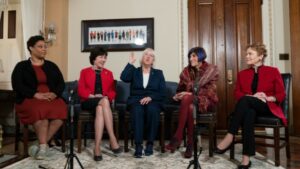America’s Leadership Means Stronger Women around the World
In our own lives and careers, we have seen remarkable changes in women’s empowerment and opportunity, not only here in America but around the world. Healthier women with access to education and the opportunity to use that knowledge in starting a business or running for office has meant less poverty, more stability, and more fair and equal societies. But, due in part to the pandemic and the recent democratic backsliding around the world, so much of what we gained is being undone. As UN Secretary General António Guterres told delegates earlier this month, the “progress won over decades is vanishing before our eyes”.
These setbacks mean that women’s equality is now at an estimated 300 years away. But while the setback is disheartening, we must respond with resolve, not remorse. From our own time in Congress, we’ve seen the change just a small investment can make, and we do not need to wait another 300 years to make a difference in the lives of girls and women. With American investments and partnerships, we can close the gap and help put this and the next generation of women on a path to opportunity and equality.
This Women’s History Month, we have an opportunity to prepare for a more equitable future by uplifting the ways America’s leadership can have a global impact, as well as here at home. That is why we believe this is a unique moment for bipartisan solidarity for American’s investments in women globally.
As former members of the U.S. Congress, we know what it takes for America to lead, and we also know that women and are trailblazers in our own right. Rep. Jenkins has written about women’s leadership in her home state and has supported the reauthorization of the Violence Against Women Act. Rep. Long Thompson represented women on the Agriculture Committee and sponsored National Women in Agriculture Day. Rep. Margolies was dedicated to women’s health, both in her time in Congress and after when she served as the director and deputy chair of the U.S. delegation to the United Nations Fourth World Conference on Women. And Rep. Comstock has been a longtime supporter of women’s leadership sponsoring an ongoing program for young women and in 2017 authored legislation requiring anti-discrimination and anti-harassment training during each session of Congress.
Now, at a time when global threats and crises are impacting women more and more severely, we believe we need to redouble our support for these programs. Strengthening American investments in diplomacy and global development is critical for strengthening women’s equality. From ensuring access to clean, drinkable water, to protecting a girl’s right to go to school, we know these investments all lead us to healthier communities, more stable countries, and a safer and more prosperous world.
With America’s support, women are beginning to start and scale businesses at the same rate as men, potentially adding $6 trillion to the global economy. Programs such as We-Fi, supported by the U.S. Department of State, and the 2x Women’s Initiative are reaching women all over the world to support them and their brighter futures.
America’s contributions are also helping women around the world gain access to education, health care, and the safety needed to enter more leadership roles. America’s investments in programs such as the President’s Emergency Plan for AIDS Relief (PEPFAR) have contributed to reducing the child mortality rate by 35 percent and the maternal mortality rate by 25 percent between 2004-2018. In addition to women’s health, investments in women as leaders is helping them attain more leadership roles in both the public and the private spheres. In 1995, just 11 percent of the world’s parliamentarians and legislators were women. By 2022, that was up to 26 percent and climbing as women continue to break down barriers and claim their power. That means that in the past 30 years, the percentage of female legislators in parliaments worldwide has grown by over 135 percent. We are living proof of this.
